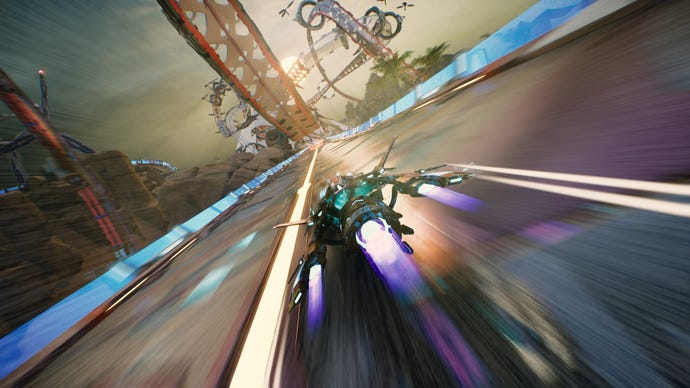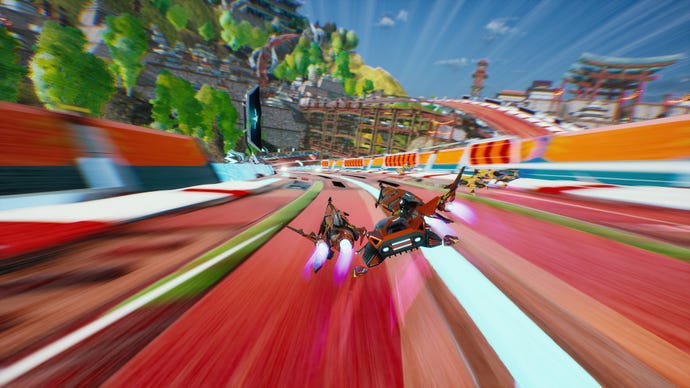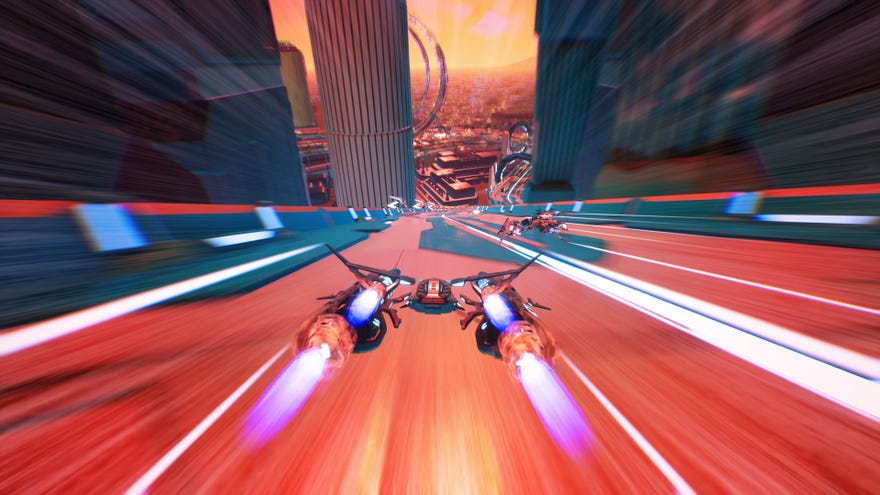Redout 2 is shaping up to be a blisteringly good anti-grav racer
It's more approachable than its predecessor too
If you’re unfamiliar with Redout, it’s an anti-gravity racer inspired by the likes of F-Zero and Wipeout. And if you’ve not played any of those before, then imagine a pod-racer from Star Wars belting it down Mario Kart’s Rainbow Road - except, hang on, there’s a mysterious white powder caked on the bristles of Mario’s mustache. The sheer speed of the first game made it pretty popular among race-heads, but a bit of a daunting prospect for those used to a traditional “wheels on the ground” racing experience.
Redout 2 doubles down on the speed element, that's for sure. But there's definitely an added air of approachability to this anti-grav racer, making the transition from Geforce to g-force a little less bruising than before. AI presets, added customisation, and more generous modes help make this a racing game you should keep up with.
I played around an hour or so of Redout 2 and was immediately dropped into the deep end. The 34BigThings devs didn't mess about: I was to race against a few of them at the fastest speed rating. Normally you'd fire up the tutorial and work your way up the speed tiers, but no, not I. A futuristic Fuji racetrack awaited me, which blurred to blues and pinks as I steered my jetfighter through its winding streets. Boy was it a thrill, generating the sort of buzz that went from laughter to silence as we all entered a flow state.
That's one thing Redout 2 does really well. Despite its ridiculous speeds, you're able to look forwards and plan ahead – if you're fast enough. And many of the game's earliest tracks offer plenty of environmental surprises, like sudden moments where the road ends and you're airborne and oh god you've got to pull off a split-second emergency landing. One track in sandy Cairo has you career through a sandstorm, while other tracks – which I can't mention here – offer cool surprises too.

Although many of the game's tracks do go from colourful landscape paintings to Monet's interpretation of Dance Dance Revolution the moment you hit the throttle. But that's par for the course when you're anti-grav racing. The ships, at least, have a real sense of character no matter what. They're less floaty than their predecessors and feel reassuringly solid as you glide them around bends. Bouncing between a number of nippy to zippy to bulky ones, they all seemed different too. Some were all-rounders, while the tankier lads took a bit more heft to get around the corners, but made up for their lack of maneuverability with bigger boost tanks.
There really are a lot of ships, all of which are fully customisable. If there's a "sporty" ship that doesn't match your steering standards, you can bosh some new bits on it to up its cornering. All of this is illustrated by a reactive spider diagram that's super easy to decipher. There is, however, a limit to upgrading your rig, as its power level increases with better parts. Tune it up to the max and you won't be able to enter certain races in certain modes because your space hopper exceeds their limits.
Having stuck with a jack-of-all-trades ship, I felt like I'd got to grips with some of the game's earliest rollercoaster rides. And while I'd love to take all the credit, the AI gets a shout-out too. One of Redout 2's new tricks is a ghostly companion that takes the form of a few presets or a bunch of individual sliders. Tune things to your liking and it'll determine how much your ship helps you out when cornering and the like. The devs hooked me up with a beginner-friendly setup and I'd like to believe it aided me. I suppose it's meant to fly under the radar, and only further testing would determine whether it's actually helping or not, but still, it's an addition that shows the game wants to make things as comfortable as possible for new players.

The same lines of approachability run through the game's arcade and career modes. Career is what you'd expect: do races, earn stars, do more races because you've earned enough stars. But the arcade offering unlocks absolutely everything from the get-go. It might not seem like a big thing, but it's a BIG thing. That's a lot of tracks and ships, all yours to mess around with as you see fit.
For the most part, Redout 2 doubles down on its predecessor’s blisteringly fast core and does its best to make things more approachable for newcomers. I certainly took to the game's style of racing, but question marks remain over whether it does enough to convert players who prefer a slower-paced kart racer or your Forza Horizons. The game is still really fast and pretty unforgiving at times, especially if you hop into some of the later courses.
Having said all that, I reckon the game is shaping up to be a hoot and deserves your attention. And if you're a fan of the previous game, Wipeout, F-Zero, or wish Alton Towers was run by F1, it's a no-brainer.


